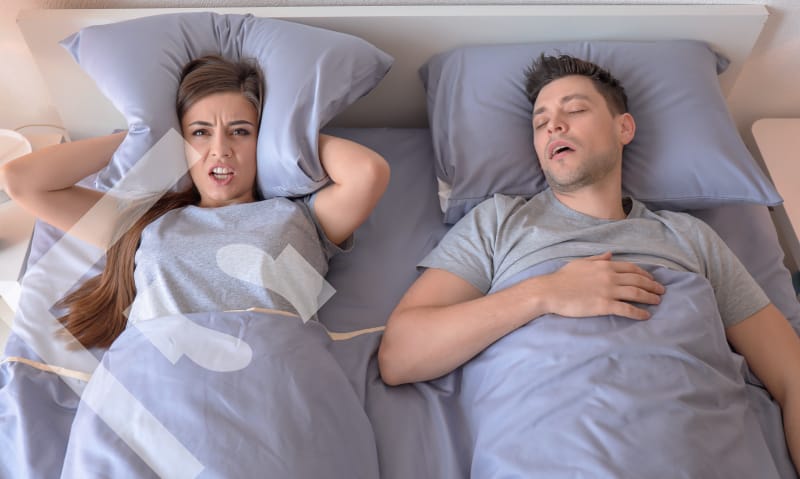8 Things Dentists Want You to Know About Snoring

Why do people snore?
Lots of people snore. In fact, approximately half of adults snore, and about a quarter of them snore habitually. Are you one of those people? Since snoring is so common, it’s easy to jump to the conclusion that it’s mildly disruptive at worst. But what is the science between snoring, and is it a problem?
1. Snoring happens when the upper airway is restricted.
Have you ever wondered what causes that loud, sometimes rattlly noise we all know as snoring? When you fall asleep, every muscle in your body relaxes, including the tissues in the back of your throat, soft palate, and nose. In people who snore, this relaxation causes their airway to narrow so when they breathe, the air is forced through, causing the tissues (such as the uvula) to vibrate and bump into each other.
2. Snoring can be a telltale sign of sleep apnea.
Not all people who snore have sleep apnea, but many do. With sleep apnea, the soft tissues relax and obstruct the airway altogether and the person actually stops breathing completely for a few seconds or up to a minute, or more.
People with sleep apnea will frequently follow this pattern: they snore, they stop breathing completely, and then wake up choking or with a gasp, and fall back asleep and breathe normally until everything relaxes, the airway becomes partially restricted, and they begin snoring again. This cycle can happen hundreds of times a night, and the sufferer may be less aware of it than their bed partner!
3. Sleep position can play a role in snoring.
Did you know that some people exclusively only snore when they sleep on their back? That’s because when they’re laying on their back, their soft palate and the back of their tongue are more likely to fall back into their airway and restrict breathing.
It all comes down to the reason you snore, though. Snoring can also be caused by quite a few different things, such as allergies and congestion, a deviated septum, and the consumption of alcohol before bed, which can relax your muscles even more.
4. Not everyone with sleep apnea snores.
Snoring is a red flag if you’re worried you have sleep apnea, but if you have other signs of sleep apnea, such as waking up foggy-brained and daytime fatigue, don’t let the fact that you don’t snore (or don’t know if you snore) fool you into thinking you don’t have the condition. Some people with obstructive sleep apnea stop breathing hundreds of times per night and never snore at all.
5. Snoring can affect your mood during the day.
Unfortunately, snoring doesn’t only affect your ability to get a quality night’s sleep. Poor sleep quality and a chronic lack of sleep have a direct impact on your mental health. People who have undiagnosed sleep apnea report higher levels of anxiety, depression, and other mental health symptoms. Are you often moody or do you struggle to concentrate on work or school? Maybe it’s because you’re not getting the quality of sleep you need.
6. Oxygen can dip extremely low during apneas.
When you stop breathing, it doesn’t take very long before your oxygen saturation starts to drop. Chronic lack of oxygen compromises every system in your body, even if it takes years before that stress shows up in lab work or medical testing. And, your body produces stress hormones when your breathing stops and starts. These hormones immediately raise your blood pressure, and over time, this puts a strain on your heart and vascular system. Research shows that people who snore are more likely to suffer from conditions, such as heart disease and diabetes.
7. A sleep doctor can help determine the cause of your snoring.
You’ve probably come to the conclusion that the risks associated with snoring and sleep apnea are too dangerous to ignore. And you’re not wrong. Even if your snoring is harmless, it’s worth making an appointment with a sleep specialist so they can help you determine that for sure. If your doctor or dentist suspects you may have sleep apnea, you might be asked to do a home sleep study or a polysomnography, which can diagnose sleep apnea.
8. Oral appliance therapy is frequently effective in cases of mild to moderate sleep apnea.
We can create a custom-made sleep appliance just for you if you need one. These oral appliances work by gently pulling your lower jaw forward, which helps keep your tongue from sliding back and obstructing your airway while you sleep. They are shown to be just as effective as CPAP therapy in mild to moderate cases of sleep apnea.
That’s great news, especially for people who cannot adjust to a CPAP machine. The bottom line? Snoring is a red flag of sleep apnea, and sleep apnea needs treatment. Luckily, we’re here to help you get the treatment you need because you deserve a good night’s rest.